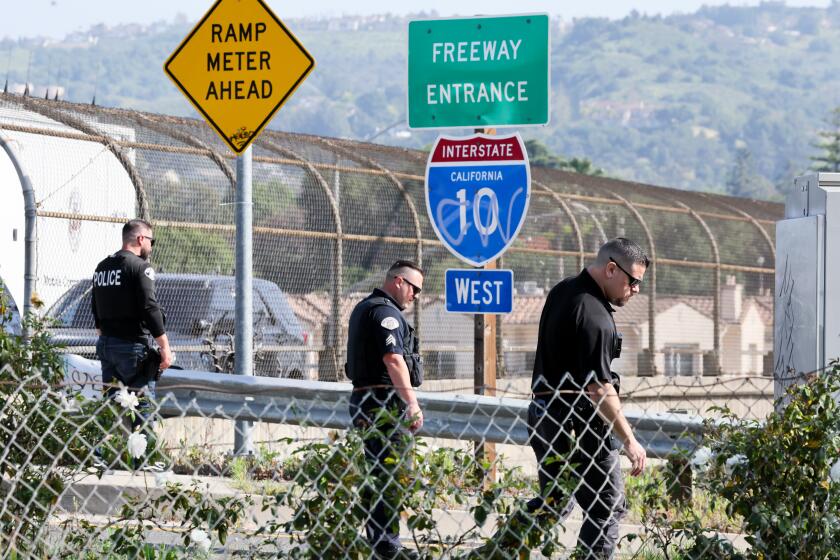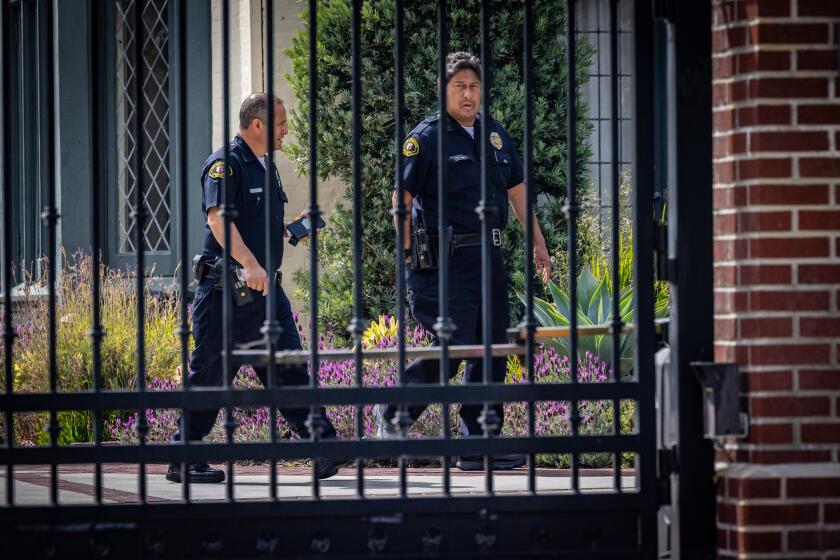Apprentices Take Law Into Their Own Hands
Photos of a defiant Cesar Chavez line the walls. A weathered packing crate, a keepsake from one of the United Farm Workers’ first table-grape contracts, sits on a bookshelf flaunting its Aztec eagle label.
It is here, in a home office near Oxnard’s agricultural heartland, that Jessica Arciniega has come to learn the law.
For decades, young idealists eager to practice law on behalf of California’s farm laborers and other indigent groups have learned their trade not in classrooms but at the elbow of veteran attorneys who serve as mentors and instructors.
California is one of seven states that allow prospective attorneys to skip law school and earn the right to practice by serving apprenticeships. The UFW has made steady use of the program, turning out half a dozen attorneys in 30 years with the same training method used by Abraham Lincoln and Clarence Darrow.
Now comes Arciniega, 29, a former UFW organizer who has completed her first year of study under Oxnard attorney Barbara Macri-Ortiz, a fiery, former union lawyer who helped set up the apprenticeship program and took that path herself.
The two have tackled torts and consumed hours of contract and criminal law, combining volumes of book work with real-world experience gleaned from Macri-Ortiz’s law practice.
Arciniega has helped clients file auto accident claims and fend off threats of eviction. She has conducted research and organized evidence for hearings to force creation of low-income housing and save the job of a Ventura County mushroom picker fired for union activity.
And after hours, she has devoted an average of 20 hours a week to her studies, cramming well into the night and on weekends in a tiny library cubicle.
Now she approaches her most important test yet. She is set later this month to take the First-Year Law Students’ Examination -- known as the Baby Bar -- to earn the right to continue her path of study for three more years.
“There’s no pomp and circumstance to this program; it’s all about how to learn the law so you can help people,” said Arciniega, a Pomona-Pitzer colleges graduate who worked on UFW union organizing campaigns before plunging into the law.
“I’ve always had this desire in me, this real soft spot, to defend the underdog,” she said. “This has been a good fit. It really focuses on the work and the results.”
Apprenticeship once was the primary means of legal education in the United States. That changed in the late 1800s with the rise of professional law schools, amid calls for quality control and the emergence of increasingly complex legal matters.
Most states, responding to pressure from the American Bar Assn., have eliminated apprenticeship programs. Those that remain get few takers. The bar association’s Code of Recommended Standards states that “neither private study, correspondence study or law office training, nor age or experience should be substituted for law school education.”
Since 1980, 436 people have registered for the apprentice program -- known as law office study -- with the State Bar of California and only 64 have passed the bar exam. Bar officials estimate that fewer than 30 people are pursuing the program at any given time.
It is a tough way to go. In the last seven years, about 20% of those who studied law as apprentices have passed the bar. That compares with slightly more than 50% of those who attended accredited law schools.
But bar officials say it’s important to keep the avenue open, noting that law office study remains a valuable option for people who live in remote areas, are launching second careers or can’t afford the tens of thousands of dollars it costs to attend law school.
Moreover, the unorthodox approach responds to larger issues of access and diversity, ensuring that the bar continues to attract people with different backgrounds, viewpoints and reasons for wanting to practice, they say.
“I think it’s important that we provide as many avenues of access to the profession, so all of society can be represented,” said Jerome Braun, the state bar’s senior executive for admissions. “If one or two Abraham Lincolns end up going through the program, getting admitted and becoming successful, we are all better off for it.”
Those states that permit law office study -- California, Maine, New York, Vermont, Virginia, Washington and Wyoming -- do so counter to a nationwide trend over the last century to standardize legal education and balance practical training with a strong theoretical base.
“It’s unlikely, but clearly not impossible, that one could get the combination of academic background and practical training that one gets in an ABA-approved law school through an internship or attorney practice situation,” said John Sebert, a Chicago-based legal education consultant to the bar association.
UCLA law professor Gary Blasi agrees. The 58-year-old lawyer said he was certain he missed out on some important theoretical lessons while doing an apprenticeship 30 years ago with a small community law office in Echo Park. But the experience of volunteering 20 hours a week at the law office in exchange for the time spent with his supervising attorney was invaluable, he said.
If it were up to him, he said, he would change the traditional three-year law school curriculum to include a year’s apprenticeship, so prospective attorneys could practice their craft.
“It wasn’t just abstract,” said Blasi, who passed the bar exam on the first try in 1976 and went on to work at the Legal Aid Foundation of Los Angeles before landing at UCLA in 1991. “When I was learning to put a complaint together, it wasn’t for an exam or a grade; there was a real person attached to the case. We were doing stuff that made a difference to somebody.”
San Francisco attorney Marilyn Kalman, who has specialized in tenants’ rights since completing an apprenticeship in 1986, believes she is like most apprentices. She was strapped for cash but eager to practice law on behalf of indigent clients who otherwise had no access to legal representation. Apprenticeship proved to be the most practical route.
“I wonder if the majority of people do it in association with some sort of philosophical cause,” she said. “I think for a lot of us, the whole thing is about using the law as a progressive tool to bring about change.”
That is exactly what UFW founder Cesar Chavez had in mind when he decided to start growing his own lawyers.
Mindful of the success former UFW General Counsel Jerry Cohen had mentoring an apprentice in the mid-1970s, Chavez set out around 1980 to establish a program that would allow union members to train under UFW attorneys and eventually take the state bar exam.
Those who were around at the time say the push was motivated in part by Chavez’s penchant for self-education, which he had used to absorb management theory and other disciplines. But they say it mostly was driven by Chavez’s undying belief that ordinary people could do extraordinary things, especially if they came from a farmworker background.
“That’s one characteristic Cesar always had: He was able to make you believe that you could do things no one else thought you could do,” said Marcos Camacho, the UFW’s general counsel and one of the first graduates of the union’s apprenticeship program.
The son of Dinuba, Calif., farmworkers and stalwart UFW supporters, Camacho was a sophomore at Cal State Fresno when union officials convinced him to take a leave of absence to help establish the program.
There were plenty of doubters, people who urged him to quit and attend a “real” law school, but Chavez encouraged him to stick with it. Now, he proudly displays a makeshift diploma from the United Farmworkers School of Law and notes that the program has a 100% pass rate for first-time bar exam takers -- better even than Harvard.
“I would do it all over again,” Camacho said. “I think it really gives you a whole different approach to law, a practical approach that really serves our clients.”
Under the program, the UFW requires a two-year commitment from attorneys after they pass the bar. Some like Camacho never leave. Others like Barbara Macri-Ortiz go off and do other work, although they remain union attorneys at heart.
“I became a lawyer because of Cesar’s good graces, and that requires me to use my license in certain ways,” said Macri-Ortiz, who since leaving the union in 1990 has largely devoted her career to working for the poor.
“One of those ways is to pass along those opportunities I’ve been given,” she said. “It’s not an easy program and it’s not for everyone. But [Arciniega is] going to make it. She’s cut out of the same cloth and brings a lot of the same skills that got me through.”
So Arciniega studies on, filling her hours with timed practice tests and essay writing in preparation for the seven-hour exam.
After a middle-class upbringing in Whittier, Arciniega attended a small private college, rejecting admission at UC Berkeley, to throw herself into social activism. She spent spring break of her junior year at UFW headquarters in the Central Valley and decided to join the union to help protect the rights of low-paid and often exploited farmworkers.
Ultimately, after years of organizing, she decided that the best way to continue on that path was to get a law license. She recently stopped work at the law office to focus full time on studies, using a $1,000 scholarship from the Mexican American Bar Assn. to help pay her bills.
When it’s all over, she doesn’t know exactly where she will practice. But she knows it will involve a continued commitment to the farmworker cause, preserving the legacy handed down by Chavez and presented to her like a gift.
“I’ve always been taught that education is not something that happens between the hours of 8 and 3, that it happens all the time and that there are many teachers,” she said. “I really feel that in working with farmworkers, they’ve been tremendous teachers to me. They’ve been my best education.”
More to Read
Start your day right
Sign up for Essential California for news, features and recommendations from the L.A. Times and beyond in your inbox six days a week.
You may occasionally receive promotional content from the Los Angeles Times.






